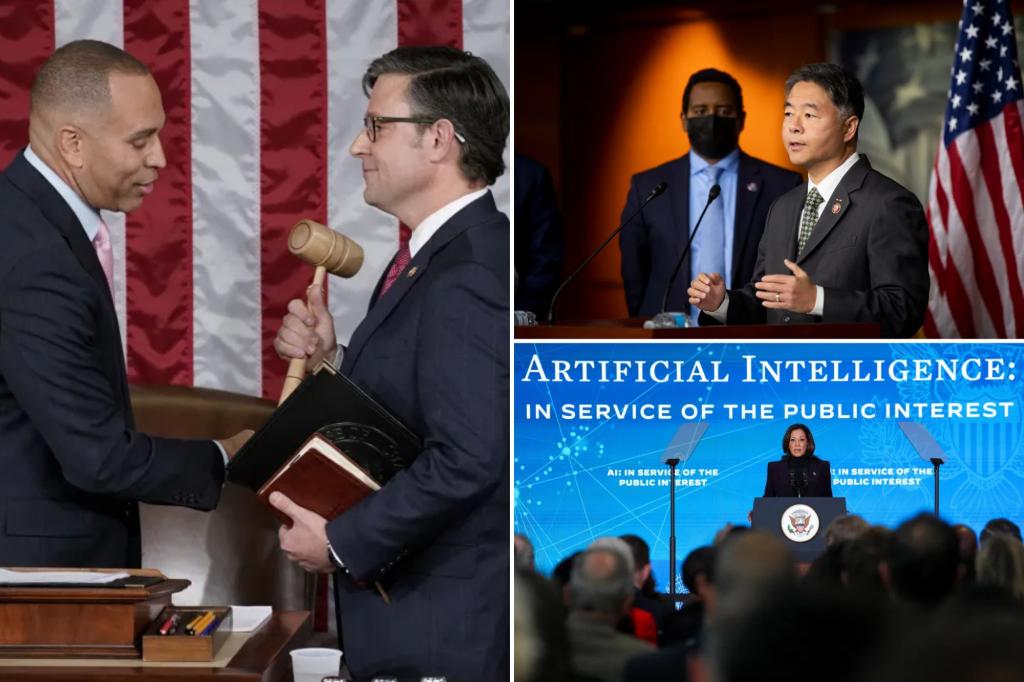House Leadership from both sides of the aisle introduced a new bipartisan task force on Tuesday focused on addressing the rapid growth of artificial intelligence.
Speaker Mike Johnson (R-La.) and Minority Leader Hakeem Jeffries (D-NY) revealed a 24-member panel that will develop a detailed report on potential safeguards for the emerging technology and propose legislative measures for Congress to uphold the US’s position as a global AI leader.
“Given the potential of artificial intelligence to swiftly reshape our economy and society, it is crucial for Congress to collaborate across party lines to comprehend and prepare for both the opportunities and challenges presented by this transformative technology,” Johnson stated.
The Task Force on Artificial Intelligence, freshly established, will be overseen by Chairs Jay Obernolte (R-Calif.) and Ted Lieu (D-Calif.), with 12 members selected from each party by Johnson and Jeffries.
Obernolte, equipped with a master’s degree in AI, is the owner of FarSight Studios, a video game company. Lieu has been actively involved in AI regulation legislation, having authored a bill using ChatGPT technology just last year.
Both Obernolte and Lieu have emerged as prominent figures in the House of Representatives concerning AI matters.
Jeffries emphasized, “Congress must support the promising advancements that artificial intelligence can offer and ensure that all Americans can reap the benefits of these innovations equitably.”
Among the Republican representatives on the panel are Ben Cline (Virginia), French Hill (Arkansas), Michael Cloud (Texas), Eric Burlison (Missouri), Rich McCormick (Georgia), Neal Dunn, Kat Cammack, Scott Franklin, and Laurel Lee (all from Florida), along with Darrell Issa and Michelle Steel (both from California).
The Democratic representatives on the panel include Bill Foster (Illinois), Brittany Pettersen (Colorado), Haley Stevens (Michigan), Suzanne Bonamici (Oregon), Valerie Foushee (North Carolina), Don Beyer (Virginia), Yvette Clarke and Alexandria Ocasio-Cortez (both from New York), as well as Anna Eshoo, Ami Bera, and Sara Jacobs (all from California).
Efforts to legislate AI advancements have faced obstacles in Congress.
Senate Majority Leader Chuck Schumer (D-NY) has shown a strong interest in advancing discussions on this issue.
President Biden has already implemented several executive actions to usher in the AI era. Vice President Kamala Harris engaged with European leaders last year to discuss AI policies.
In recent years, the tech industry has witnessed a surge in generative AI capabilities, enabling the creation of text, images, and other content based on open-ended prompts.
Despite its imperfections and occasional malfunctions, this technology has raised concerns about the potential displacement of numerous jobs in the future due to its widespread adoption.
OpenAI made waves in late 2022 with ChatGPT, a sophisticated language model that responds to open-ended requests and generates contextually relevant content.
Recently, the AI startup teased its Dora AI program, designed to produce photorealistic videos based on simple text inputs from users.
The impact of this technology is already being felt in political campaigns.
Just last month, fraudulent robocalls mimicking Biden’s voice attempted to dissuade voters from supporting him in New Hampshire.
The Federal Communications Commission recently prohibited the use of AI-generated clone voices.










